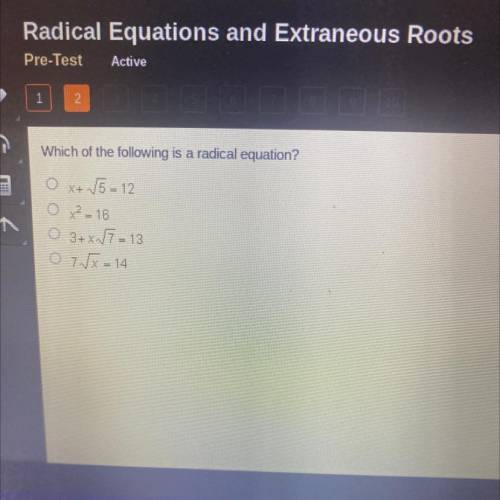Which of the following is a radical equation?
X +
√5 = 12
x = 16
O 3+x/5=13
...

Mathematics, 09.06.2021 23:10 myparentsrock17
Which of the following is a radical equation?
X +
√5 = 12
x = 16
O 3+x/5=13
O 7 dx = 14


Answers: 1


Other questions on the subject: Mathematics


Mathematics, 21.06.2019 15:00, m4167281
Achemist has 200 ml of a 10% sucrose solution. she adds x ml of a 40% sucrose solution. the percent concentration, y, of the final mixture is given by the rational function: the chemist needs the concentration of the final mixture to be 30%. how many milliliters of the 40% solution should she add to the 10% solution to get this concentration?
Answers: 1

Mathematics, 21.06.2019 19:30, leilanimontes714
Solve the following simultaneous equation by using an algebraic method (either substitution or elimination) 2x + 3y=-4 4x-y=11
Answers: 1

Mathematics, 22.06.2019 02:00, Zaxx2974
Part a what is the area of triangle i? show your calculation. part b triangles i and ii are congruent (of the same size and shape). what is the total area of triangles i and ii? show your calculation. part c what is the area of rectangle i? show your calculation. part d what is the area of rectangle ii? show your calculation. part e rectangles i and iii have the same size and shape. what is the total area of rectangles i and iii? show your calculation. part f what is the total area of all the rectangles? show your calculation. part g what areas do you need to know to find the surface area of the prism? part h what is the surface area of the prism? show your calculation. part i read this statement: “if you multiply the area of one rectangle in the figure by 3, you’ll get the total area of the rectangles.” is this statement true or false? why? part j read this statement: “if you multiply the area of one triangle in the figure by 2, you’ll get the total area of the triangles.” is this statement true or false? why?
Answers: 1
You know the right answer?
Questions in other subjects:



History, 28.07.2019 12:00



Mathematics, 28.07.2019 12:00


Arts, 28.07.2019 12:00




